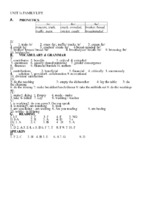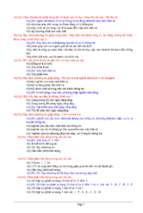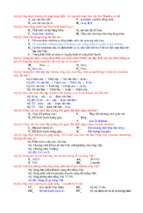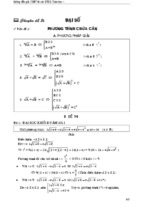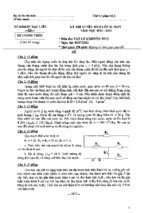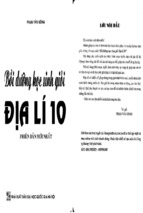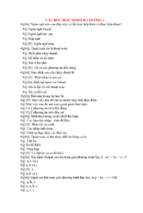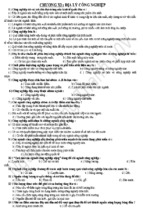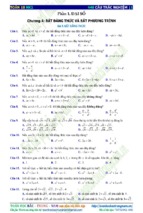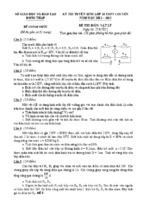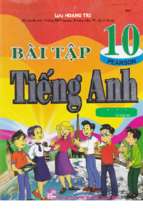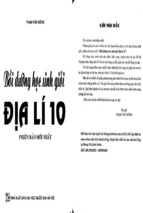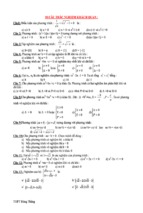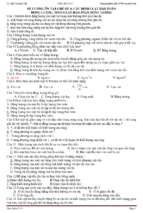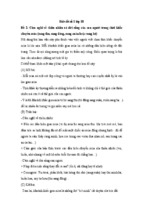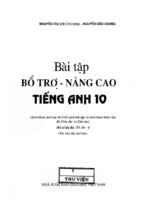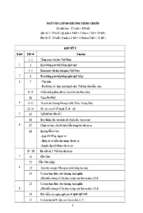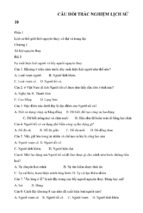Gia sư Thành Được
www.daythem.edu.vn
Ôn t ậ p n g ữ p h á p t i ế n g A n h 1 0
§1. Revision of the Present Simple, Present Progressive, Present Perfect and Past Simple
Revision
►Form
Present Simple S + V
Present Progressive S + am/ is/ are + V-ing
Present Perfect S + have/ has + Past Participle
Past Simple S + V-ed/ Verb in column 2
►Use
Present Simple: something always true (past, present and future).
Nhung rides her bike to school. (Her habit every day)
Present Progressive: something happened at/ around the moment of speaking.
Ngoc often goes to school by bus, but today she is riding her bike to school. (At the moment of
speaking).
Present Perfect:
1. Something beginning in the past and continuing to the present.
Binh has studied in that school for four years. (He is still studying there now.)
2. Something happening at an unspecified point of time in the past.
She has just washed her clothes.
Past Simple: something beginning and ending in the past.
Huy studied in that school for four years. Then, he moved to another school.
Exercises
A. Choose the best answer for each of the following sentences.
1. Tien isn’t at home. He ____________ at the office.
A. works B. working
C. has worked D. worked
2. This is the first time Quyen ______________ to the Mekong Delta, so everything is strange to
her.
A. is going B. has gone
C. went D. has been
3. Ha _____________ a dog, but it _____________ three years ago.
A. had/ died B. had/ dead
C. has had/ died D. has/ died
4. Thuan ______________ in the kitchen. She _______________ dinner.
A. is/ prepare B. is being/ is preparing
C. is/ is preparing D. is being/ has prepared
5. Nam Cao ___________ a lot of excellent novels during his life.
A. writes B. is writing
C. has written D. wrote
6. Mr. Nam is a novelist and he ______________ a lot of novels.
A. writes B. is writing
C. has written D. wrote
7. – Can I speak to Vien, please?
- I’m sorry, she ___________ out.
A. has gone B. has been
C. went D. was
8. Ngoc ____________ badminton in her free time, but now she __________ swimming.
Gia sư Thành Được
www.daythem.edu.vn
Ôn t ậ p n g ữ p h á p t i ế n g A n h 1 0
A. plays/ prefers B. plays. Is preferring
C. played/ prefers D. has played/ prefers
B. Supply the correct tenses of the verb in parentheses.
1. – What (do) _________________?
- I (look) ______________ for the information about Helen Keller.
2. Mr. Vinh is a writer. He (write) ________________ 4 novels.
3. My father (retire) _____________________ last months. He (work) _______________ all his
life for one company.
4. You can use my dictionary. I (not/ need) ___________________________ it at the moment.
5. Hurry up! The bus (come) ______________________.
6. The team (win) _____________________ 15 games so far this season.
Last season, they (win) _______________ only 13 games.
C. Write true sentences about yourself, using the activities below, Remember to supply the
correct forms of the verbs.
Simple Present Present Progressive Present Perfect Past Simple
Get up early Wear a white T-shirt Be abroad Go to the movie
theatre last night
Ride a bike to
school Wear a watch Study English for
more than 5 years.
Read a comic
book last week
Brush teeth twice
a day Do English exercises Listen to English
music
Eat a big breakfast
last weekend
Have more than
one sister Stay at home Join an English
speaking club
Help Mum do
housework
yesterday
Like candies Wear glasses See a famous person Be absent from
class yesterday
Example: I get up early.
I don’t ride a bike to school.
1. ..............................................................................................................................
2. ..............................................................................................................................
3. ..............................................................................................................................
4. ..............................................................................................................................
5. ..............................................................................................................................
6. ..............................................................................................................................
7. ..............................................................................................................................
8. ..............................................................................................................................
9. ..............................................................................................................................
Gia sư Thành Được
www.daythem.edu.vn
10. ............................................................................................................................
11. ............................................................................................................................
12. ............................................................................................................................
13. ............................................................................................................................
14. ............................................................................................................................
15. ............................................................................................................................
16. ............................................................................................................................
17. ............................................................................................................................
18. ............................................................................................................................
19. ............................................................................................................................
20. ............................................................................................................................
D. Make a similar table, using your own information. The write sentences.
Simple Present Present Progressive Present Perfect Past Simple
Ôn t ậ p n g ữ p h á p t i ế n g A n h 1 0
1. ..............................................................................................................................
2. ..............................................................................................................................
3. ..............................................................................................................................
4. ..............................................................................................................................
5. ..............................................................................................................................
6. ..............................................................................................................................
7. ..............................................................................................................................
8. ..............................................................................................................................
Ôn t ậ p n g ữ p h á p t i ế n g A n h 1 0
§ 2. Revision of the Past Simple and Past Perfect.
Revision
► Form
Past simple S + V-ed/ Verb in column 2
Past Perfect S + had + past participle
►Use
Past Simple
An activity in the past
Hung came to my house yesterday.
Past perfect
An activity that was completed before
another activity in the past
I had already gone out when he got to
my house.
An activity that had happened before a
point of time in the past.
Mai had finished her homework by 5 p.m
yesterday.
►Note
When before or after is used, the past perfect is not always necessary because the time relationship is
clear.
The basketball match had started before you arrived at the stadium.
The basketball match started before you arrived at the stadium.
After Lien had started the phone, she went out.
Gia sư Thành Được
www.daythem.edu.vn
After Lien answered the phone, she went out.
Exercises
A. Choose the best answer for each of the following sentences.
1. Did anyone forget to lock the door yesterday afternoon?
A. I don’t know. I went out by noon.
B. I don’t know. I had gone out by noon.
2. Why are you so good at advertising?
A. I worked for an advertising company for 5 years.
B. I had worked for an advertising company for 5 years.
3. You lived in Hue from 1995 to 2000, right?
A. Yes,. And I lived in Da Nang by that time.
B. Yes. And I had lived in Da Nang by that time.
4. How did the play end?
A. No idea. I left when it ended.
B. No idea. I had left when it ended.
5. Did you see Lan yesterday?
A. Yes. She was having lunch when I saw her.
B. Yes. She was having lunch when I had seen her.
B. Simple Past or Past Perfect? Use the Simple Past or Past Perfect tense of the verbs in the list.
lend reach be
work change act
meet begin recognize
consider
1. Mr. Hai is a journalist for a famous newspaper in Ha Noi. Before being a journalist, he
___________________ as a teacher.
2. I (never) ____________________ in front of so many audiences so I was very nervous in the
play.
Ôn t ậ p n g ữ p h á p t i ế n g A n h 1 0
3. As soon as tourists ________________ the village, it ________________ to rain.
4. Last month, a friend of mine ___________________ me the book “Harry Potter” and I adored it
from the very beginning. Until that time, I (never) _________________ it interesting.
5. We are very lucky and happy because our country ___________________ independent by the
time we were born.
6. Last night, I ________________ my old friend at the bus stop. At first, I (not)
_________________ her because she ______________ a lot.
C. Reading the following passage and fill in each blank with appropriate tense and form of the
word in parentheses.
Yesterday, (1) ____________ (be) a terrible day to me. When I (2) _____________ (leave)
home for work at 7, it (3) ____________ (begin) to rain. Since I (4) ____________ (not/have) an
umbrella, I (5) ______________ (run) to the bus stop near my house. Then, when I (6)
_____________ (get) into the bus, I (7) ______________ (discover) that I (8) _____________
(leave) my wallet at home.I was so embarrassed that I (9) ______________ (not/know) what to say.
Luckily, a kind woman (10) _____________ (lend) me 2000 dong to pay for the ticket.
On the way home after work, I (11) _______________ (remember) that I (12) _____________
(not/take) the key with me so I couldn’t enter my house. I had to wait until my sister (13)
______________ (come) home at night.
I thought a lot that night, and I had a lesson from that day. All the bad luck of the day (14)
Gia sư Thành Được
www.daythem.edu.vn
_____________ (be) just because I (15) _____________ (not/prepare) well the night before.
Ôn t ậ p n g ữ p h á p t i ế n g A n h 1 0
§3. Will, Be going to and Present Progressive
Revision
►Form
Future Simple S + will + bare infinitive
Near Future S + am/ is/ are going to + bare inf
Present Progressive S + am/ is/ are + V-ing
►Use
Future Simple: Describe something you have just decided to do now.
- Do you know tomorrow is Lan’s birthday?
- Really? I’ll send a card.
Near future: Describe something you have already decided to do before now or something that
is sure to happen.
- Can you lend me your dictionary?
- Sorry but I’m going to use it.
Present Progressive: Describe something you have already decided to do and made an
arrangement.
- We are visiting Miss Ha this Sunday. Will you join us?
- What a pity! I’m taking part in the TOEFL on that day.
Exercises
A. Choose the most appropriate reply to each of the following sentences.
1. There’s a good film on at Minh Chau movie theatre tonight.
A. Wow! I’ll go and see it.
B. Wow! I’m going to see it.
C. Wow! I’m seeing it.
2. The doorbell’s ringing.
A. I’ll answer it.
B. I’m going to answer it.
C. I’m answering it.
3. How about the picnic this weekend?
A. Sorry I’ll fly to Ha Noi.
B. Sorry I’m going to fly to Ha Noi.
C. Sorry I’m flying to Ha Noi.
4. What’s wrong with you? Your face looks red.
A. I’ll be ill.
B. I’m going to be ill.
C. I’m being ill.
5. Do you want some tea?
A. No, thanks. I’ll have a cup of coffee at the office, as usual.
B. No, thanks. I’m going to have a cup of coffee at the office, as usual.
C. No, thanks. I’m having a cup of coffee at the office, as usual.
B. Put the verbs in the correct tense (future simple, near future or present progressive)
Ôn t ậ p n g ữ p h á p t i ế n g A n h 1 0
C. Each of the following sentences has a mistake on the verb tense. Find and correct it.
1. Do you know Miss Mai will get married next month?
...............................................................................................................................
Gia sư Thành Được
www.daythem.edu.vn
2. A: I’m afraid we have to change our plan. We can’t meet at the Italian restaurant because it’s
closed.
B: In that case, I’m going to see you at Van Khoa coffee shop.
...............................................................................................................................
3. Look! Cong Vinh has the ball near the goal. He is scoring a goal.
...............................................................................................................................
4. The exam is not very difficult. I think Phat is passing it.
...............................................................................................................................
5. Ask Miss Nhu if you don’t understand the lesson. I’m sure she is going to help you. She’s very
nice.
...............................................................................................................................
D. Write true sentences about yourself based on the following cues. Remember to use the correct
tense (future simple, near future or present progressive). Add the time if necessary.
1. Go on a picnic.
...............................................................................................................................
2. Phone on old friend.
...............................................................................................................................
3. Spend my summer vacation in the mountains.
...............................................................................................................................
4. Take part in voluntary activities.
...............................................................................................................................
5. Study another foreign language.
...............................................................................................................................
6. Join a school sport team.
...............................................................................................................................
7. Find a part time job.
...............................................................................................................................
8. Pass the entrance exam to university.
...............................................................................................................................
1. Look at the sky. There are a
lot of clouds. It (rain)
__________________
2. Oh dear! We (play)
_______________ soccer this
afternoon. We’ve even bought
a new ball for this match.
3. I’m afraid you have to delay
the match. I hope the weather
(be) ________________ fine
next week.
4. I hope so. So this afternoon I
(stay) ________________ to
fix the bike.
5. I (lend) ______________
you a hand. Anyway, I’m
free all day.
Ôn t ậ p n g ữ p h á p t i ế n g A n h 1 0
Gia sư Thành Được
www.daythem.edu.vn
§4. Passive voice
Revision
►Form
Active S + V + O
Passive S + be + past participle (+ by agent)
(same tense)
Active: Peter builds a house.
Passive: A house is built by Peter.
►Use
Passive is used when
- We do not care who causes the action.
- We do not know who causes the action.
►Note
We cannot change an active sentence into passive if that sentence doesn’t have an object.
I go to school everyday.
(“go” is an intransitive verb and doesn’t have an object.)
When the subject in the active sentence is “someone, people” or pronouns such as “I, you, he”,
etc… we do not use “by + agent” in the passive sentence.
Someone broke the window.
The window was broken. (NOT: by someone)
When the verb in the active sentence has two objects, (Direct Object Od and Indirect Object Oi),
there are two ways to change the sentence into passive.
Active S + V + Od + to/ for + Oi
Passive S + be + past participle + to/ for + Oi (+ by agent)
(same tense)
Active: Mary sent a letter to John two weeks ago.
Passive: A letter was sent to John two weeks ago.
Active S + V + Oi + Od
Passive S + be + past participle + Od (+ by agent)
(same tense)
Active: My brother bought me a blue shirt.
Passive: I was bought a blue shirt.
Exercises
A. Correct the mistakes where necessary.
1. By 2010, the new house will have been building.
...............................................................................................................................
2. Our uncle is taken Susan to hospital.
...............................................................................................................................
3. The car is repaired at the moment.
...............................................................................................................................
Ôn t ậ p n g ữ p h á p t i ế n g A n h 1 0
4. He will be become a millionaire in the future.
...............................................................................................................................
5. John was glad when he was received the gold medal.
...............................................................................................................................
6. A robber broke the window of the shop.
...............................................................................................................................
Gia sư Thành Được
www.daythem.edu.vn
7. I was given to a nice dress for my 18th birthday.
...............................................................................................................................
B. Complete the following sentences with a correct passive construction.
1. We require suitable candidates to be bilingual.
Suitable candidates ................................................................................ bilingual.
2. The Chairman of the Board asked the Managing Director to remain in charge for another year.
The Managing Director ..................................................................... another year.
3. The entire press corps is interviewing him right now.
He ......................................................................................................... right now.
4. Didn’t anyone tell you to wear a jacket and tie in the restaurant?
............................................................... to wear a jacket and tie in the restaurant?
5. They will have to rebuild the entire front of the prototype.
The entire front of the prototype ............................................................................
6. Nobody has ever called me “Honey”!
............................................................................................................... “Honey”!
7. I haven’t decided on anything yet.
Nothing ............................................................................................................ yet.
8. Someone told me that the road works caused delays.
........................................................................... that the road works cause delays.
9. People sometimes say that every cloud has a silver lining.
It ..................................................................... that every cloud has a silver lining.
C. Fill in the blanks with the suitable tenses and forms of the words in brackets.
1. The words ___________________ (explain) by the teacher today.
2. We ___________________ (send) a letter the day before yesterday.
3. This street ___________________ (already/ close) because of snow.
4. A new restaurant ___________________ (open) next week.
5. He ___________________ (invite) to his classmate’s party yesterday.
6. I ___________________ (give) the book by my friend next Tuesday.
D. Choose the best answer to fill in the blanks.
1. An interesting idea ___________________ for discussion.
A. put forward B. was putting forward
C. was putted forward D. was put forward
2. My debt ___________________ in five years time.
A. will paid off B. will being paid off
C. will be payed off D. will be paid off
3. Visitors’ coats ___________________ over there.
A. can hung up B. can be hung up
C. can be hanged up D. can hang up
4. The flood water ___________________ by barriers.
A. was be kept back B. was been kept back
C. was being kept back D. was being keep back
5. The protesters ___________________ by the police.
A. are being held back B. are being holding back
C. are being hold back D. are holding back
6. Nothing ___________________ me.
Ôn t ậ p n g ữ p h á p t i ế n g A n h 1 0
A. can held against B. can be held against
Gia sư Thành Được
www.daythem.edu.vn
C. can be hold against D. can be holding against
7. She ___________________.
A. had be never heard of B. has never been heared of
C. has never been herad of D. has never been hearing of
8. The inconvenience ___________________ by this money.
A. will make up for B. will being made up for
C. will been made up for D. will be made up for
9. Three thousand employees ___________________.
A. were lied off B. were laying off
C. were layed off D. were laid off
10. ___________________ to you yet?
A. Have the book been given back B. Have the book been gave back
C. Have the book been give back D. Have the book being given back
Ôn t ậ p n g ữ p h á p t i ế n g A n h 1 0
§5. Passive Voice with Modals
Revision
►Form
Active S + modal + V + O
Passive S + modal + be + past participle (+ by agent)
(same tense)
Active: You must do this immediately.
Passive: This must de done immediately.
Active S + modal + have + past participle + O
Passive S + modal + have been + past participle (+ by agent)
(same tense)
Active: They may have built the house in 1970.
Passive: The house may have been built in 1970.
Exercises
A. Change the following sentences into passive, using the words given.
1. It’s time the government took actions to solve the problem of unemployment. (must)
...............................................................................................................................
2. Why don’t you paint the wall? (should)
...............................................................................................................................
3. You must never tell the truth to anyone. (mustn’t)
...............................................................................................................................
4. If you don’t do your homework, your teacher may punish you tomorrow. (by)
...............................................................................................................................
5. Read the document carefully before giving your signature. (should)
...............................................................................................................................
6. People can hear the fishing fleet from afar. (be)
...............................................................................................................................
7. The students must do this exercise in class. (home)
...............................................................................................................................
B. Read the situations and make sentences using passive voice with modals of the verb given.
1. The pipe is leaking. (repair)
It ............................................................................................................................
2. John is seriously ill today. (take)
Gia sư Thành Được
www.daythem.edu.vn
He ..........................................................................................................................
3. This is a secret. (tell)
It ............................................................................................................................
4. My car was outside some minutes ago, but I can’t see it anywhere now. (steal)
...............................................................................................................................
5. This mushroom is poisonous. (eat)
This mushroom ......................................................................................................
6. The flowers are withering due to a lack of water. (water)
The flowers ............................................................................................................
7. Anne fell off the tree and she couldn’t walk. (break)
Ôn t ậ p n g ữ p h á p t i ế n g A n h 1 0
Anne’s leg ..............................................................................................................
C. Underline the correct answer.
1. You (mustn’t be overcome/ mustn’t overcome) by the difficulties if you want to succeed in life.
2. A party (may be given/ may being given) this weekend.
3. Nothing (can’t be hear/ can be heard) because of the noisy surroundings.
4. Nobody (could be received/ could receive) the gold medal.
5. You (must be feeling/ must be felt) very happy because you’ve passed your final exam with
satisfying marks.
D. Use the correct forms of the verbs in the box together with the modal verbs suggested after
each sentence to make meaningful and correct sentences.
split up understand shoot throw out spend
shake think of shut write sweep
1. The bottle _____________________. (should not)
2. The class _____________________ into groups of five in this speaking activity. (should)
3. He _____________________ in the crossfire yesterday. (might)
4. The door _____________________. I can’t remember closing it. (can’t)
5. They _____________________ so much money on the army. (should)
6. All eventualities _____________________ so that nothing will surprise us. (must)
7. Nothing more _____________________ about love. (can)
8. Cleanliness is the slogan of the day. So everything __________________ diligently. (must)
9. Batteries _____________________ in the communal waste. (must not)
10. He speaks very slowly, so his _____________________ easily. (can)
Ôn t ậ p n g ữ p h á p t i ế n g A n h 1 0
§6. Present Perfect Passive
Revision
►Form
Active S + have/ has + past participle + O
Passive S + have/ has been + past participle (+ by agent)
Active: Somebody has eaten all the apples.
Passive: All the apples have been eaten.
►Use
To express an activity in the past but the result is in the present when it is not important to know
the subject.
The house is new now. It has been painted.
(We needn’t know who had painted the house)
To express an activity happening before now without knowing the time and it is not important to
Gia sư Thành Được
www.daythem.edu.vn
know the subject.
The letter you sent her hasn’t been read yet.
►Note
When we want to show who has performed the action, we use “by + agent”.
The computer has been bought by another customer.
Exercises
A. Each sentence has a mistake. Find and correct it.
1. I have been invited to a party last week.
have been was
2. The house is in a bad condition. It has ever been tidied since 1995.
...............................................................................................................................
3. Tien has a pain on his leg because he has been fallen off his bike.
...............................................................................................................................
4. The thieves has been arrested.
...............................................................................................................................
5. My jacket has been mended my aunt.
...............................................................................................................................
6. The man has never seen before.
...............................................................................................................................
B. Put the verbs in brackets in the present perfect tense, either active or passive.
1. Long has to go to school by bus. His bike (steal) ______________________.
2. Nga has a broken leg. She (fall) ______________________ off her motorbike.
3. We have to stop since the motorbike (run) ______________________ out of petrol.
4. The letter (send) _________________ but why _________ I (receive) ___________ it yet.
5. It (never, be) ______________________ so hot this year.
6. ______________ the meal (prepare) ____________________ yet?
7. ______________ anyone (see) ___________________ Hai recently?
8. It is the first time Nhan (rush) ______________________ to hospital.
C. What has happened? Use the present perfect passive.
1. The clothes are clean now.
They have been washed.
2. Mai and Thanh have two invitation cards to a party.
Ôn t ậ p n g ữ p h á p t i ế n g A n h 1 0
They ......................................................................................................................
3. The watch didn’t work yesterday; but now it is OK.
It ............................................................................................................................
4. There was a forest here; but now it is a clear land.
The trees ................................................................................................................
5. I can’t go to my room.
My key ..................................................................................................................
6. There is no grass in the garden.
The grass ...............................................................................................................
7. There is no waste paper in the waste bin.
The waste bin .........................................................................................................
8. People don’t have to pass the river on boats now.
A new bridge .........................................................................................................
D. Linda has a robot at home but her mother doesn’t want her to be lazy. She wants her to do the
Gia sư Thành Được
www.daythem.edu.vn
house work on her own. One day, when she comes home, the house is very tidy. She asks Linda
some questions. Make questions and answers from the words provided, using the present perfect
passive.
1. The floor / clean
Mother: Has the floor been cleaned?
Linda: Yes, mum.
2. The dishes / wash
Mother: ..................................................................................................................
Linda: Of course they have.
3. The clothes / iron
Mother: How about the clothes? .............................................................................
Linda: Look. They are all in the wardrobe.
4. The dinner / table
Mother: ..................................................................................................................
Linda: Yes, it has.
5. The bed / make
Mother: ..................................................................................................................
Linda: It was made in the morning.
6. The meal / prepare
Mother: ..................................................................................................................
Linda: Yes. Can you smell the food?
7. The flowers / water
Mother: ..................................................................................................................
Linda: They are fresh now.
8. Homework / do
Mother: You are so excellent. ................................................................................
Linda: Yes, Mum.
Mother: Hm… Linda. Have you done all of the work?
Linda: Hm… I’ve only done my homework. The others have been done by the robot.
Ôn t ậ p n g ữ p h á p t i ế n g A n h 1 0
§7. Comparisons
Revision
►Form
COMPARISONS OF EQUALITY
as + adjective / adverb + as
not as/ so + adjective / adverb + as
Tuan is as tall as his brother.
Lam is not as clever as Thanh
COMPARISONS OF SUPERIORITY
short adjective / adverb –er + than
more + long adjective / adverb + than
less + adjective / adverb + than
Your CD player is cheaper than mine.
The French restaurant is more expensive than the Italian restaurant.
This term test is less difficult than the last one.
►Use
Comparatives are used to compare two things or places or people.
Gia sư Thành Được
www.daythem.edu.vn
►Note
Short Adjectives: adjectives that have only one syllable.
Long Adjective: adjectives that have more than one syllable.
Two-syllable adjectives that en in –ow, -et, -le, -y are considered short adjectives.
narrow narrower quiet quieter clever cleverer
simple simpler busy busier
With some adjectives that end with consonant – vowel – consonant, we double the last letter.
big bigger hot hotter
Two-syllable adjectives that end in –y, we make the comparative by changing the y to i and
adding er.
angry angrier
Some common irregular comparatives
Adj / Adv Comparative Superlative
good / well better the best
bad / badly worse the worst
much / many more the most
little / few less the least
far farther / further the farthest / furthest
Exercises
A. Fill in the blanks with suitable words.
1. This exercise is ____________________ than the previous one. I can do the previous one very
easily, but not this one.
2. Riding a horse is not ____________________ riding a bike. You need more skills and practice
to ride a horse.
3. These computers are ____________________ than those.
4. The world problems are getting ____________________ to solve.
5. Bob is ____________________ than his brother. He can solve almost any math problem.
6. This time he’s made ____________________ mistakes because he’s a proofread more carefully.
7. – Who is ____________________, Mary or Jane?
- I think Mary is. She’s 1.75 meters high.
Ôn t ậ p n g ữ p h á p t i ế n g A n h 1 0
8. Are you sure that Sydney is ____________________ than Anchorage?
9. Your glasses are ____________________ mine. Mine cost only 20,000 dong.
10. I don’t think this unit is ____________________ than the previous one. I can understand this
one better.
B. In the following six sentences, there is only ONE true sentence. Correct the factual mistakes in
the rest 5. Write the correct sentences in the spaces provided.
1. Mt. Blanc is higher than Mt. Everest.
...............................................................................................................................
2. Italy is bigger than France.
...............................................................................................................................
3. The USA is further from England than Australia.
...............................................................................................................................
4. The German population is higher than the Indian population.
...............................................................................................................................
5. Chicago is more famous than New York.
...............................................................................................................................
Gia sư Thành Được
www.daythem.edu.vn
6. Living in London is more expensive than living in Ha Noi.
...............................................................................................................................
C. Complete each sentence using an adjective from the box with –er or more or irregular.
expensive / cheap big / small
hot / cold good / bad
1. If something improves, it gets ................................................................................
2. If something deteriorates, it gets ............................................................................
3. If something heats up, it gets ..................................................................................
4. If something cools down, it gets .............................................................................
5. If prices go up, they get ..........................................................................................
6. If prices go down, they get .....................................................................................
7. If something expands, it gets ..................................................................................
8. If something shrinks, it gets ...................................................................................
D. Correct the grammatical and spelling mistakes.
1. Chicago is dangerouser than London.
2. New York is biger than Chicago.
3. Americans work more hard than English people.
4. The transport in London isn’t as well than San Francisco.
5. The Americans drive more fast than the English.
6. I’m more happy now because I’ve got a new job.
7. Terminator 3 is badder than Terminator 2.
8. Basketball players are more taller than baseball players.
Ôn t ậ p n g ữ p h á p t i ế n g A n h 1 0
§8. Conditional Sentences
Revision
►Form
If clause Main clause
Type 1
Real in the Present/
Future
Present Simple Future Simple
Type 2
Unreal in the Present Past Simple
would
could + bare infinitive
might
Type 3
Unreal in the past Past Perfect
would
could + have + past participle
might
If the weather is fine, my family will spend the weekend in the country.
I would help Hanh if I was/ were you.
If it hadn’t been for your help, I wouldn’t have succeeded.
►Note
We can use can/ may + bare infinitive in main clause for type 1.
Hey! Let’s buy a map. We may get lost if we don’t have a map.
Gia sư Thành Được
www.daythem.edu.vn
For Type 2, in if clause, we can use either past simple or past subjunctive.
(Past subjunctive: we always use were for the verb to be)
If I was/ were a teacher, I would be an English teacher.
Exercises
A. Choose the correct response for each of the following sentences.
1. Excuse me! Can you show me the
way to Tao Dan park?
2. I really want to please my parents but
I don’t know how.
3. Will you go on a picnic on Sunday?
4. Hoang! Can you lend me a hand?
5. How much sugar would you like in
your coffee?
6. Yesterday was Tam’s birthday.
7. Today’s a volunteer day. Every one’s
sweeping the streets outside.
A. I would have sent her a card if I had
known.
B. I would if I weren’t busy.
C. If I were you, I would talk to them
to see what they think.
D. I would join them if I weren’t ill.
E. If you go straight a long Nguyen Thi
Minh Khai street, you’ll see it on
your left.
F. We will if it doesn’t rain.
G. A little. If you add so much, it’ll be
very sweet.
B. Supply the correct forms of the verb in parentheses, using conditional sentences (Type 1, 2, 3).
Phuc: Excuse me, Miss Xuan! I was absent yesterday, so I don’t understand much about
your physics lesson about rains.
Miss Xuan: What a pity! If you (1)_______________ (be) in class yesterday, you
(2)______________ (see) a documentary about rains. So what isn’t clear to you?
Phuc: Why does it rain?
Miss Xuan: Well! If the clouds (3)________________ (become) so heavy for the steam in the air,
rain drop (4)________________ (appear) and (5)___________________ (fall) down.
Phuc: What about hails? Is there ice in the clouds?
Miss Xuan: Of course not. If the temperature (6)__________________ (be) under 0oC, the rain
drops (7)___________________ (become) ice, like in the refrigerator. Is there hail in
Viet Nam, Phuc?
Phuc: Rarely.
Ôn t ậ p n g ữ p h á p t i ế n g A n h 1 0
Miss Xuan: Right. But if it (8)___________________ (hail), what (9)______________ you
_________ (do) to keep safe?
Phuc: I wouldn’t go out because it would be very dangerous.
C. Make conditional sentences (Type1, 2, 3) from the following situations.
1. Thanh is a good student. She is going to take an exam. Her parents have promised to give her a
Gia sư Thành Được
www.daythem.edu.vn
new bike as a gift for a good result.
If Thanh has a good result, her parents will give her a new bike.
2. Mr. Thuan had an accident last week. His head was badly injured because he didn’t wear a
helmet.
...............................................................................................................................
3. Lien forgot to lock her bike when she went into the bookstore, so it was stolen.
...............................................................................................................................
4. Suong always does morning exercises. That is why she has very good health.
...............................................................................................................................
5. Loc is going to take an example but he does not know which books he should read. He thinks he
will ask his teacher and she can help him.
...............................................................................................................................
6. Many people lost their homes in the tsunami in 2004.
...............................................................................................................................
7. The river is dirty because people keep throwing waste into it.
...............................................................................................................................
D. Answer the following questions, using conditional sentences.
1. What would you do if you were of the opposite sex?
...............................................................................................................................
2. What would you do if you had one million dong?
...............................................................................................................................
3. What would you do if a foreign spoke so fast that you couldn’t understand?
...............................................................................................................................
4. What would you do if after a meal at a restaurant, you discovered that you had left your money
at home?
...............................................................................................................................
5. What would you do if a day had 25 hours?
...............................................................................................................................
6. What would you do if you saw an accident but you were nearly late for school?
...............................................................................................................................
Ôn t ậ p n g ữ p h á p t i ế n g A n h 1 0
§9. Information Questions
Revision
►Form
Question word Examples
Who (subject) - Who is knocking at the door?
Who (object) - Who are you talking to?
What (subject) - What happened in 1945?
What (object) - What do you want to be in the future?
Where - Where can I find the best food in the city?
When - When did the World War II start?
Which - Which soup would you like, tomato or potato soup?
Why - Why are you crying?
Whose - Whose pen is it?
How - How do you travel to school?
Exercises
A. Supply the correct words for the following questions.
Gia sư Thành Được
www.daythem.edu.vn
1. Mommy! ____________ is the sky so blue?
2. ____________ large is Vietnam?
3. There were two cakes on the table, ____________ has eaten one?
4. – Please give me my coat. I have to leave now.
- There are two coats. ____________ one is yours?
5. Excuse me. ____________ is the nearest hotel?
6. ____________ do you mean by saying you are full? You haven’t had much food. Try some
more.
7. A: Can I speak to Tung, please?
B: He’s gone out.
A: ____________ will he come back?
B: I’m sorry I don’t know.
8. - Hey! I have a new job?
- Congratulations! ____________ company?
9. - ____________ is the weather?
- It’s the nicest day I’ve ever seen.
10. - ____________ nationality are you?
- Vietnamese.
11. - Nhan has three bags. ____________ bag does he like most?
- The blue one.
B. Match the questions in column A to their appropriate answers in column B.
AB
1. Who knows the answer?
2. What was the movie about?
3. What brand name is your TV?
4. How long does it take to go to your house?
5. Whose book are you holding?
6. How many times do I have to tell you not to
run around?
7. Where were you last month? I phoned you
but you weren’t in.
8. What is the capital of China?
a. I’m sorry, Mum.
b. It’s Sony.
c. In 10 minutes.
d. For 10 minutes.
e. Me
f. I was sick.
g. A sad love story in China.
h. Lan’s. She left it here.
i. Beijing.
j. In Beijing. I was on
Ôn t ậ p n g ữ p h á p t i ế n g A n h 1 0
9. When will the match start?
10. Why didn’t you go to class yesterday?
business.
C. Make questions for the following replies.
Gia sư Thành Được
www.daythem.edu.vn
1. ...............................................................................................................................
I’d like a beefsteak, please.
2. ...............................................................................................................................
I’m watering the plants in the garden.
3. ...............................................................................................................................
It takes about ten minutes to go to school.
4. ...............................................................................................................................
She’s 1.6 meter tall.
5. ...............................................................................................................................
The red book is mine.
D. Hung is at an oral exam in English. Below is the information about him. Work in pair. One is
the examiner and the other is Hung. Make questions and answer.
Name: Dang Van Hung
Age: 15
Class: 10B
Date of birth: Mar 14, 1991
Place of birth: Can Tho
Address: 125 Nguyen Trai Str, District 1
Hobbies: swimming and reading
Favourite subject: English and Georgraphy
Started studying English: 10 years old in a
center near home.
Reasons for studying English: like it, father is
an English teacher.
Examiner
1. What your name?
2. …………………………………….
3. …………………………………….
4. …………………………………….
5. …………………………………….
6. …………………………………….
7. …………………………………….
8. …………………………………….
9. …………………………………….
10. …………………………………….
11. …………………………………….
Hung
1. I’m Hung, Dang Van Hung.
2. …………………………………….
3. …………………………………….
4. …………………………………….
5. …………………………………….
6. …………………………………….
7. …………………………………….
8. …………………………………….
9. …………………………………….
10. …………………………………….
Gia sư Thành Được
www.daythem.edu.vn
11. …………………………………….
E. Now, you are talking the oral exam. Ask and answer about yourself and fill in the information
below.
Examiner
1. What your name?
2. …………………………………….
3. …………………………………….
4. …………………………………….
5. …………………………………….
6. …………………………………….
7. …………………………………….
8. …………………………………….
You
1. My name is ……………………….
2. …………………………………….
3. …………………………………….
4. …………………………………….
5. …………………………………….
6. …………………………………….
7. …………………………………….
8. …………………………………….
Ôn t ậ p n g ữ p h á p t i ế n g A n h 1 0
9. …………………………………….
10. …………………………………….
11. …………………………………….
9. …………………………………….
10. …………………………………….
11. …………………………………….
Name: ………………………………………….
Age: ……………………………………………
Class: ………………………………………….
Date of birth: …………………………………
Place of birth: ………………………………..
Address: ………………………………………
Hobbies: ………………………………………
Favourite subject: ……………………………
Started studying English: ……………………
………………………………………………….
Reasons for studying English: ……………….
………………………………………………….
Ôn t ậ p n g ữ p h á p t i ế n g A n h 1 0
§10. Defining Relative Clauses
Revision
►Form
Function
No comma used in defining relative clause.
Relative pronouns
Gia sư Thành Được
www.daythem.edu.vn
Person Thing
Subject who / that which / that
Object who / whom / that which / that
Possessive whose whose
►Use
Defining relative clauses are clauses that give essential information to define or identify the
person or thing we are talking about. Obviously, this is only necessary if there is more than one person
or thing involved.
Students who have good marks will receive presents.
(There are many students, but only those with good marks can get presents.)
►Note
The relative pronoun stands in place of a noun. This noun usually appears earlier in the
sentence.
The woman who spoke at the meeting was my sister.
Who, whom and which can be replaced by that. This is very common in spoken English.
The woman who / that spoke at the meeting was my sister.
The relative pronoun can be omitted when it is the object of the clause.
The mouse that the elephant loved was very beautiful.
Or The mouse the elephant loved was very beautiful.
Both of these sentences are correct, though the second one is more common in spoken English.
Whose is used for things as well as for people.
The man whose car was stolen is my friend’s father.
Whom is very formal and is only used in written English. You can use who / that, or omit the
pronoun completely.
The doctor whom / who / that I was hoping to see wasn’t on duty.
That normally follows
- words like something, anything, everything, nothing, all, only, much, little, some, no and
superlatives.
I will give you all the money that I have.
He was the first person that could answer such a difficult question.
Everything that I learned proves to be useful now.
This is the most beautiful dress that I have.
- mixed antecedent
I haven’t seen the man and his two dogs that passed my house everyday lately.
- interrogative pronoun who and that
Who is she that you say hello?
We cannot use that
- in non-restrictive clause
John, who (not that) we are talking about, is a teacher.
- after preposition
The bed which we sleep in is very comfortable.
(= The bed in which we sleep is very comfortable.)
The bed that we sleep in is very comfortable.
Ôn t ậ p n g ữ p h á p t i ế n g A n h 1 0
BUT NOT: The bed in that we sleep is very comfortable.
Exercises
A. Combine the following sentences using defining relative clauses.
- Xem thêm -

